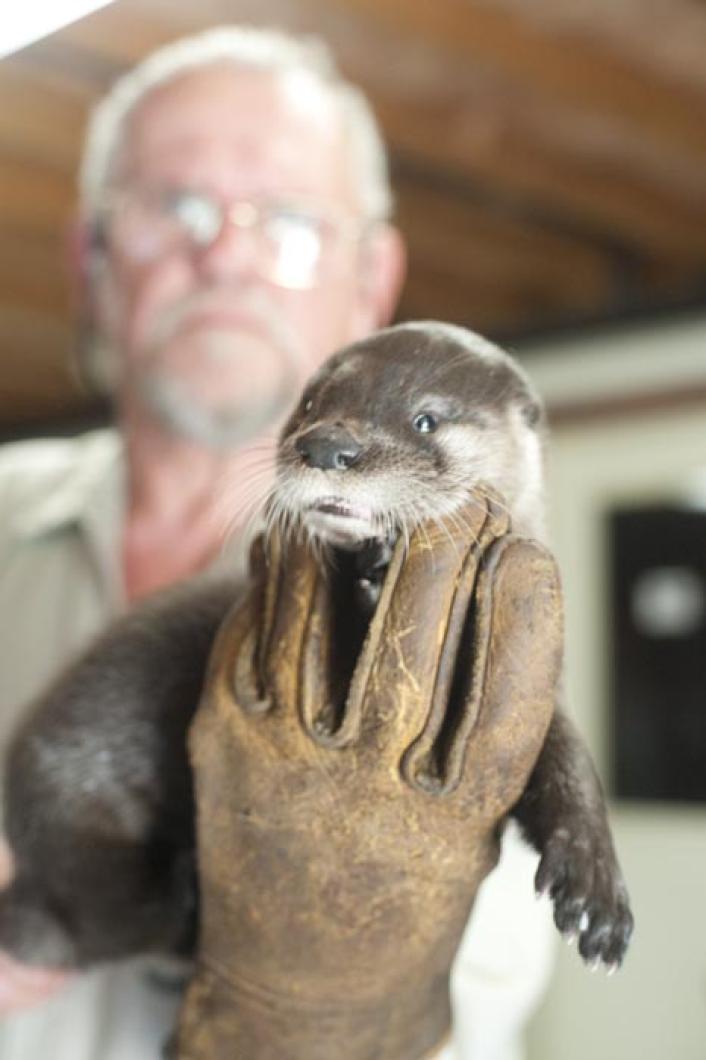A valiant effort to save the life of two malnourished baby otters came to an end over the weekend.
One otter, found in a yard in Oak Bluffs on Thursday afternoon and sent Friday morning to the Trailside Museum in Milton, died over the weekend. A second baby otter, recovered on Friday not far from where the first otter had been found, also died.
The two otters, about eight weeks old, lost their mother when she was hit and killed on Barnes Road in Oak Bluffs on the morning of June 7.
Augustus Ben David 2nd, the preeminent Vineyard naturalist who owns the World of Reptiles and Bird Park in Edgartown, was at the center of the rescue effort. Mr. Ben David said he believes the death of the mother and subsequent loss of her two pups is environmental and linked to the decline in bait fish in Island coastal waters. He said a lack of herring in coastal ponds is forcing some otters to look farther inland for fish.
Otters commonly feed on herring and small bait fish at this time of year. It turns out that the mother otter had established her den near a small, manmade freshwater fishpond owned by Andrea Rogers of Oak Bluffs.
The tragedy began to unfold on the morning of Tuesday, June 7, when Derick Araujo, driving a Cape Cod Express vehicle, noticed a dead otter in the middle of Barnes Road. He called his mother in law, Sheila Baird of Edgartown, who contacted Mr. Ben David. “Right after she called me, I went immediately to the spot and picked up the dead otter,” Mr. Ben David said. He continued:
“Now the sad part is that it was a nursing female. So that means you may find as many as three orphan pups somewhere. The only thing you can do is wait, wait for the call. When a female gets hit, the young ones stay in the nest cavity. As the starvation progresses they will come out of hiding. With starvation, they will start to lose whatever fear they have instinctually of people. They wander around and emit a hunger cry.”
When this type of event involves a raccoon or squirrels, Mr. Ben David said the best course is to euthanize the young animals. “They have no educational value,” he said, noting that there is no need to save the animal and return it to the forest since it is quite common.
Otters are a different story, Mr. Ben David said. “As people increase, boat traffic increases, pollution increases, otters become more and more fragile. We have an otter population on Martha’s Vineyard, but it is a fragile population. Otters have the potential to be either rehabilitated successfully and returned to the wild, or they can turn into an educational animal,” he said.
Andrea Rogers had watched her goldfish disappear in her fishpond for weeks leading up to the first week in June. She said she lost as many as 150 goldfish — likely to the female otter, given what is now known. Then last week she saw a small baby otter wandering around her yard. She saw the baby go up to the edge of the fishpond, but it didn’t go into the water. Mrs. Rogers said she thought the baby otter was probably too young and didn’t know how to swim for its food.
She contacted Mr. Ben David on Thursday. Mr. Ben David arrived that afternoon and recovered the animal. He then called Norman Smith, director of the Massachusetts Audubon Society’s Blue Hills Trailside Museum in Milton. On Friday morning, Mr. Ben David made arrangements to have the otter sent over on the Patriot ferry to be met on the Falmouth side by Mr. Smith. Mr. Smith’s museum has an otter rehabilitation facility.
Mr. Ben David learned on Monday that the animal had died. Another juvenile otter was recovered near Mrs. Rogers’s home and died a short time later.
Mr. Ben David said it is clear that environmental changes are placing new pressures on the otters. “There is a correlation between the degradation of the Island ponds, not having as many finfish as they once had,” he said, adding: “This in the same way has affected ospreys. We don’t have the finfish in our ponds like we used too. Look at the herring. Herring were the mainstay on this Island.” He continued:
“You never heard of otters getting into people’s fishponds, because of the plethora of food in the natural environment. These otters used to raise their young ones on herring and flounder and perch and eels. They love eels.”
Mr. Ben David offered this advice: “If you have a fishpond on Martha’s Vineyard and you have a beautiful koi or you’ve got goldfish, sooner or later you will be paid a visit by either a family or an individual otter.
“They know where every single body of water is located, by smell. When you create a pond in your backyard, I don’t care if it is in the middle of Chilmark or in the middle of the state forest — once that pond has finfish in it, if it has amphibians in it, the sense factor will be picked up by an otter.”
Mr. Ben David said he appreciated the cooperative effort everyone played in trying to save the baby otters, despite the outcome, especially crediting Mr. Araujo for taking the first step to report the dead otter in the middle of the road.







Comments (1)
Comments
Comment policy »